Interview with Fiddlin' Frenchie Burke in Llano, TX, 2010
©
2010 / Bruno Michel;
Fotos Bruno Michel
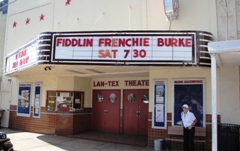 Almost
every small town in Texas has it's own Country Opry. In the city of Llano,
the Opry is located at the historic LanTex Theater. Usually, an Opry
features a concert every
Almost
every small town in Texas has it's own Country Opry. In the city of Llano,
the Opry is located at the historic LanTex Theater. Usually, an Opry
features a concert every 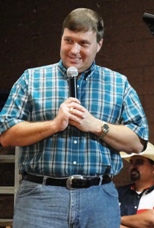 month.
And sometimes you get to hear acts, for which you'd have to pay quite some
fees elsewhere. Tracy Pitcox, the driving force of the Heart Of Texas
Country Music Association, is serving several Oprys with acts who call
the label Heart Of Texas Records their home.
month.
And sometimes you get to hear acts, for which you'd have to pay quite some
fees elsewhere. Tracy Pitcox, the driving force of the Heart Of Texas
Country Music Association, is serving several Oprys with acts who call
the label Heart Of Texas Records their home.
Fiddlin' Frenchie Burke, born
Leon Burke in Kaplan, Louisiana, lives in Texas for many years. So it was
only a matter of time until he'd show up for a gig close to our home. Llano
is about an hour's drive from our place. A great opportunity to spend a Saturday
night and do an interview.
BM:
Frenchie, itís almost forty years since you published your first album. I
guess the title was Fiddliní Frenchie Burke and the outlawsÖ
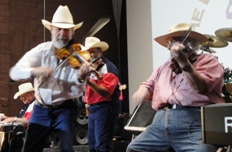
FB:
Ö.1975Ö
BM:Öhow in your opinion has the business changed
since then?
FB: Everything's changed. The people, the attitudes.
We older folks are fading away, younger ones take over. They donít play the
country anymore that Iím used to. Itís changed so much. I like my era better
of course. I think, George Strait and Alan Jackson said it all in their song
Murder On Music Row.
BM: In May you had the Fiddliní Frenchie
Burke Music Festival. We had a Texas Music Jam event shortly
after near our hometown, where hardly anyone showed up. How do you 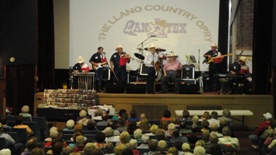
make
your event so successful?
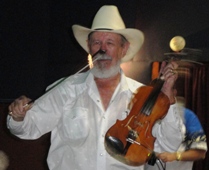
FB:
Work and advertising, a lot of. Even George Strait needs to advertise his
gigs. This is our seventh year and we donít charge cover charge at
all. Itís all paid by sponsors from the area. That means nobody makes money.
Our volunteers go through the neighbor towns and put up posters. All they
get is a meal and a meeting with the artists.
BM:
Isnít that whatís missing today? The love for the music? You mention that
you donít charge people to come see you and your friends. I think most of
the events today are about business and money and not about music.
FB: Yes, Sir. Of course, I live in Lytle, Texas
and therefore people know my name around here. We had over sixthousand people
this year. In our first, we started off with one stage, running from 2pm to
10pm. This year we ran from 11am to 10pm with three stages. The vendors are
growing, too., just by word of mouth and our regular advertising. 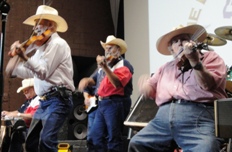
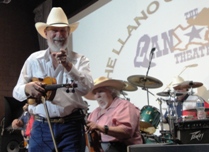
BM:
Where is the difference between the Frenchie Burke Iím talking to now and
the Frenchie Burke on stage?
FB: Iím kinda laid back off stage while I am
very active on stage. I have fourteen grandkids, and my wife and I are raising
two of them. One is eight and oneís gonna be ten. That keeps me busy. But
otherwise thereís not much difference, I am always entertaining people, no
matter what. We have coffee at a local restaurant every morning and I always
come up with some new jokes.
BM:
You also toured the world outside the US. What makes the difference between
a European audience and one from the US?.
FB: Itís hard to tell. When I was at the Trucker
Festival in Germany, I noticed that almost everyone in that tent had
never heard of me. But once I started my music and moved between the audience
while playing, they went crazy. Over here, they mostly know my name and what
they can expect. But they hardly have to get the security 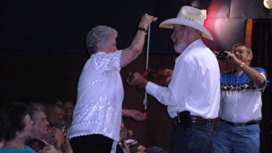
guards
to calm down folks like they had to in Germany. Other than that, there is
no difference in people who love music and having fun. Well, maybe the language.
I remember the second time I was at that festival, they had a Hungarian band
playing and singing country music as if they were from the US. But off stage,
none of them understood a single word of English. 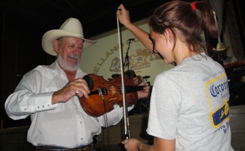
BM: If you wouldnít have had a career
as a fiddler, what would your profession be today?
FB: I would be retired Military. My dad was a
carpenter. I did some of that but wasnít really good at it. Musicís been my
life since 1963. Iíve been on the road ever since.
BM: What would you like people to remember you
for in fifty years from now?`
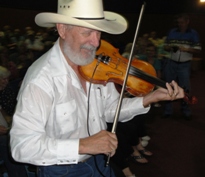
FB:
First of all that I was a nice guy. I was sober, didnít take any dope. And
then that I was an entertainer. One time, a guy about my age told me: "Mr.
Burke, Johnny Gimble is the best fiddle player I ever heard. But you, Sir,
are the best fiddle player I ever saw." Isnít that a compliment. I told
this to Gimble one day and he said: "Well, heís right, I can play better
than you but I canít jump up and down as you do while playing." 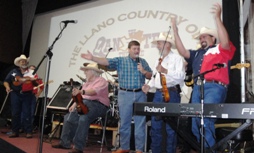
BM: You played with many great artists.
Is there someone you would still like to share the stage with?
FB: Hard to say. I played with so many people.
Ray Price, Charlie Daniels, Johnny Bush, Jimmy Dickens. I really canít think
of anyone right now.
BM: You ever played with Doug Kershaw?
FB: Oh yeah, at the Charlie Daniels Celebrity
Golf Classics. We are actually competing because we do the same thing.
People donít like that too much. But heís a great guy. And heís making more
money than I am because heís playing all these casinos. He married a rich
lady from Colorado and they live out on a ranch. But heís still working the
casinos, thatís all he has to do.
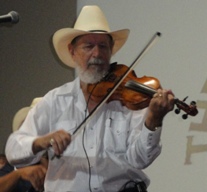
BM:
Which three things would you take on a lonesome island? 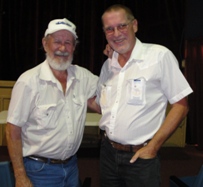
FB: My wife and my two grandkids that weíre raising.
BM:
If you were to interview Frenchie Burke, which question would you ask him
that I did not?
FB: You pretty much covered it, I guess. Unless
you would go into talking about the family and all that stuff. What people
may not know, I also play a little guitar, not much, just enough to sing.
Or that my step-grandfather taught me how to play the fiddle when I was eleven.
By thirteen Iíve learned enough to be better than him.
BM: Thatís what we call a natural talent. Thank
you so much for the interview.
FB: My pleasure, thank you.
 Almost
every small town in Texas has it's own Country Opry. In the city of Llano,
the Opry is located at the historic LanTex Theater. Usually, an Opry
features a concert every
Almost
every small town in Texas has it's own Country Opry. In the city of Llano,
the Opry is located at the historic LanTex Theater. Usually, an Opry
features a concert every  month.
And sometimes you get to hear acts, for which you'd have to pay quite some
fees elsewhere. Tracy Pitcox, the driving force of the Heart Of Texas
Country Music Association, is serving several Oprys with acts who call
the label Heart Of Texas Records their home.
month.
And sometimes you get to hear acts, for which you'd have to pay quite some
fees elsewhere. Tracy Pitcox, the driving force of the Heart Of Texas
Country Music Association, is serving several Oprys with acts who call
the label Heart Of Texas Records their home.BM:Öhow in your opinion has the business changed since then?
FB: Everything's changed. The people, the attitudes. We older folks are fading away, younger ones take over. They donít play the country anymore that Iím used to. Itís changed so much. I like my era better of course. I think, George Strait and Alan Jackson said it all in their song Murder On Music Row.
BM: In May you had the Fiddliní Frenchie Burke Music Festival. We had a Texas Music Jam event shortly after near our hometown, where hardly anyone showed up. How do you
FB: Yes, Sir. Of course, I live in Lytle, Texas and therefore people know my name around here. We had over sixthousand people this year. In our first, we started off with one stage, running from 2pm to 10pm. This year we ran from 11am to 10pm with three stages. The vendors are growing, too., just by word of mouth and our regular advertising.
FB: Iím kinda laid back off stage while I am very active on stage. I have fourteen grandkids, and my wife and I are raising two of them. One is eight and oneís gonna be ten. That keeps me busy. But otherwise thereís not much difference, I am always entertaining people, no matter what. We have coffee at a local restaurant every morning and I always come up with some new jokes.
FB: Itís hard to tell. When I was at the Trucker Festival in Germany, I noticed that almost everyone in that tent had never heard of me. But once I started my music and moved between the audience while playing, they went crazy. Over here, they mostly know my name and what they can expect. But they hardly have to get the security
FB: I would be retired Military. My dad was a carpenter. I did some of that but wasnít really good at it. Musicís been my life since 1963. Iíve been on the road ever since.
BM: What would you like people to remember you for in fifty years from now?`
FB: Hard to say. I played with so many people. Ray Price, Charlie Daniels, Johnny Bush, Jimmy Dickens. I really canít think of anyone right now.
BM: You ever played with Doug Kershaw?
FB: Oh yeah, at the Charlie Daniels Celebrity Golf Classics. We are actually competing because we do the same thing. People donít like that too much. But heís a great guy. And heís making more money than I am because heís playing all these casinos. He married a rich lady from Colorado and they live out on a ranch. But heís still working the casinos, thatís all he has to do.
FB: My wife and my two grandkids that weíre raising.
FB: You pretty much covered it, I guess. Unless you would go into talking about the family and all that stuff. What people may not know, I also play a little guitar, not much, just enough to sing. Or that my step-grandfather taught me how to play the fiddle when I was eleven. By thirteen Iíve learned enough to be better than him.
BM: Thatís what we call a natural talent. Thank you so much for the interview.
FB: My pleasure, thank you.